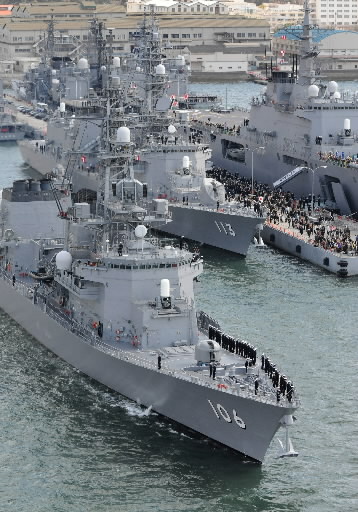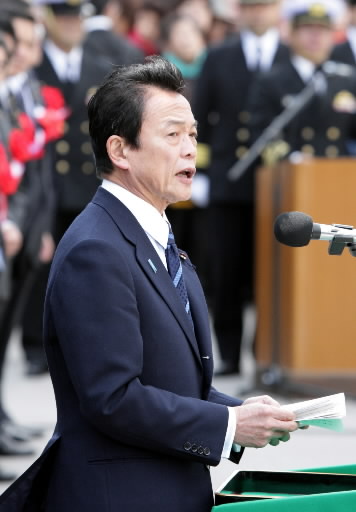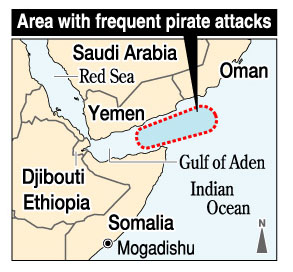Two warships leave Kure for Somalia on anti-piracy mission
Mar. 19, 2009
by Taiji Shimizu, Staff Writer
Two destroyers based at the Kure Naval Base of the Japan Maritime Self-Defense Force (JMSDF), Sazanami and Samidare, left their home port on March 14 for an anti-piracy mission off the coast of Somalia. This is the first time members of the SDF are being sent overseas for maritime security operations based on the Self-Defense Forces Act. These ships will patrol the waters off the coast of the African country to protect Japanese ships and nationals.
First mission of sea patrol overseas
Prime Minister Taro Aso and Defense Minister Yasukazu Hamada were present at a ceremony held before the departure at the naval base. Prime Minister Aso offered words of encouragement to some 400 crew members. Through this mission, he said, hard as it may be, safety on the seas will be ensured.
Captain Hiroshi Goto, Commander of JMSDF Escort Flotilla 8, will lead the dispatched corps. Capt. Goto expressed the members’ determination to act with one accord in order to complete the mission. As the two ships left the port shortly after 2:00 pm with crew members standing in neat rows on the decks, 1,200 people, including family members, waved to see them off.
These ships will escort, in principle, only Japanese vessels and those carrying Japanese nationals and cargo. Ship personnel are allowed to use weapons only for self-defense or averting imminent danger, in line with provisions of the Act Concerning Execution of Duties of Police Officials.
The Japanese government has already won cabinet approval for new anti-piracy legislation that will allow SDF destroyers to fire at pirate ships and to escort foreign vessels. If the new law is enacted, the legal basis of the operation will be altered from a maritime security operation to an operation under the new law.
A total of eight Coast Guard officers, who have the authority of the judicial police, are on board the ship in case pirates are captured. Members of the special security squad, a special unit of the MSDF, are also on board in the event that pirate ships are fired upon. Each ship carries two patrol helicopters and two high-speed boats. The Defense Ministry is also preparing to deploy P3C patrol aircraft.
The supply bases for the two ships are in Djibouti, Yemen, and Oman. According to the ministry’s operation procedure, meeting points will be set to the east and west sides of the Gulf of Aden. The destroyers will then escort ships by “sandwiching” them as they pass through this area of the sea.
Groups opposed to the dispatch held demonstrations on the water near the base on the day of the ships’ departure. Hiroshima Prefectural Police and the 6th Regional Maritime Safety Headquarters patrolled the area and no major disturbances were observed.
(Originally published on March 15, 2009)
by Takumichi Watanabe, Staff Writer
Two escort ships from the Kure Naval Base will face armed pirates on the Maritime Self-Defense Force’s first overseas mission of maritime security operations. Without a legal framework for such missions already in place, their use of weapons is limited to self-defense and the averting of imminent danger. Unlike past international contributions of largely logistical support, the new mission runs the risk of direct conflict.
The national government adopted new legislation for anti-piracy at a Cabinet meeting one day before the destroyers left port. The legislation authorizes firing on pirate ships if the vessels come close despite repeated warnings. If the new law is enacted, this standard will then be applied.
As an emergency measure, the current mission will be conducted within the framework of maritime security operations in the case of violations of territorial waters. The new law, if enacted, will authorize the dispatch of SDF personnel to any area to deal with piracy. What is expected after this is the enactment of a general law to authorize the dispatch of personnel as needed for international peacekeeping operations. Although this new legislation will relax the standards for the use of weapons, these standards must be applied with discretion.
Anti-piracy measures are designed to protect the lives and property of Japanese nationals. How future incidents will handled in foreign territory remains uncertain.
Towada, a supply vessel also based at Kure, has been engaged in a refueling mission in the Indian Ocean since November 2008 under the new special measures law on terrorism. The destroyers are the first to be sent on an anti-piracy mission. The Chugoku Shimbun interviewed 100 citizens of Kure, home to the naval base, and 51 judged the dispatch favorably. The biggest concern for those opposed to the dispatch is that the lives of the personnel may be placed in danger. The feelings of the crew themselves and their families can well be imagined.
The overseas missions of the SDF have gradually expanded with the enactment of new legislation, such as the PKO cooperation law and the special measures law on terrorism. To prevent overseas missions from growing without sufficient debate, lawmakers should define the philosophy and framework of overseas missions while engaged in their deliberations in order to ensure that these missions will be consistent with Japan’s constitution, which renounces the use of force overseas.
(Originally published on March 15, 2009)
Two destroyers based at the Kure Naval Base of the Japan Maritime Self-Defense Force (JMSDF), Sazanami and Samidare, left their home port on March 14 for an anti-piracy mission off the coast of Somalia. This is the first time members of the SDF are being sent overseas for maritime security operations based on the Self-Defense Forces Act. These ships will patrol the waters off the coast of the African country to protect Japanese ships and nationals.
First mission of sea patrol overseas
Prime Minister Taro Aso and Defense Minister Yasukazu Hamada were present at a ceremony held before the departure at the naval base. Prime Minister Aso offered words of encouragement to some 400 crew members. Through this mission, he said, hard as it may be, safety on the seas will be ensured.
Captain Hiroshi Goto, Commander of JMSDF Escort Flotilla 8, will lead the dispatched corps. Capt. Goto expressed the members’ determination to act with one accord in order to complete the mission. As the two ships left the port shortly after 2:00 pm with crew members standing in neat rows on the decks, 1,200 people, including family members, waved to see them off.
These ships will escort, in principle, only Japanese vessels and those carrying Japanese nationals and cargo. Ship personnel are allowed to use weapons only for self-defense or averting imminent danger, in line with provisions of the Act Concerning Execution of Duties of Police Officials.
The Japanese government has already won cabinet approval for new anti-piracy legislation that will allow SDF destroyers to fire at pirate ships and to escort foreign vessels. If the new law is enacted, the legal basis of the operation will be altered from a maritime security operation to an operation under the new law.
A total of eight Coast Guard officers, who have the authority of the judicial police, are on board the ship in case pirates are captured. Members of the special security squad, a special unit of the MSDF, are also on board in the event that pirate ships are fired upon. Each ship carries two patrol helicopters and two high-speed boats. The Defense Ministry is also preparing to deploy P3C patrol aircraft.
The supply bases for the two ships are in Djibouti, Yemen, and Oman. According to the ministry’s operation procedure, meeting points will be set to the east and west sides of the Gulf of Aden. The destroyers will then escort ships by “sandwiching” them as they pass through this area of the sea.
Groups opposed to the dispatch held demonstrations on the water near the base on the day of the ships’ departure. Hiroshima Prefectural Police and the 6th Regional Maritime Safety Headquarters patrolled the area and no major disturbances were observed.
(Originally published on March 15, 2009)
Commentary: Delayed enactment of new legislation poses danger
by Takumichi Watanabe, Staff Writer
Two escort ships from the Kure Naval Base will face armed pirates on the Maritime Self-Defense Force’s first overseas mission of maritime security operations. Without a legal framework for such missions already in place, their use of weapons is limited to self-defense and the averting of imminent danger. Unlike past international contributions of largely logistical support, the new mission runs the risk of direct conflict.
The national government adopted new legislation for anti-piracy at a Cabinet meeting one day before the destroyers left port. The legislation authorizes firing on pirate ships if the vessels come close despite repeated warnings. If the new law is enacted, this standard will then be applied.
As an emergency measure, the current mission will be conducted within the framework of maritime security operations in the case of violations of territorial waters. The new law, if enacted, will authorize the dispatch of SDF personnel to any area to deal with piracy. What is expected after this is the enactment of a general law to authorize the dispatch of personnel as needed for international peacekeeping operations. Although this new legislation will relax the standards for the use of weapons, these standards must be applied with discretion.
Anti-piracy measures are designed to protect the lives and property of Japanese nationals. How future incidents will handled in foreign territory remains uncertain.
Towada, a supply vessel also based at Kure, has been engaged in a refueling mission in the Indian Ocean since November 2008 under the new special measures law on terrorism. The destroyers are the first to be sent on an anti-piracy mission. The Chugoku Shimbun interviewed 100 citizens of Kure, home to the naval base, and 51 judged the dispatch favorably. The biggest concern for those opposed to the dispatch is that the lives of the personnel may be placed in danger. The feelings of the crew themselves and their families can well be imagined.
The overseas missions of the SDF have gradually expanded with the enactment of new legislation, such as the PKO cooperation law and the special measures law on terrorism. To prevent overseas missions from growing without sufficient debate, lawmakers should define the philosophy and framework of overseas missions while engaged in their deliberations in order to ensure that these missions will be consistent with Japan’s constitution, which renounces the use of force overseas.
(Originally published on March 15, 2009)










